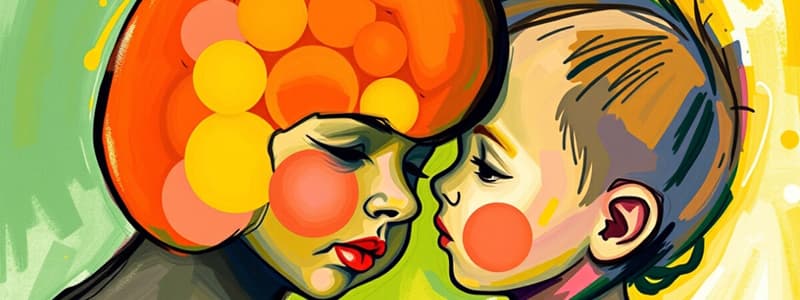Podcast
Questions and Answers
What does biological preparedness mean in the context of social interaction?
What does biological preparedness mean in the context of social interaction?
Infants come into the world prepared for social interaction. They are receptive to certain cues.
What happens when mothers face their infants with a still face?
What happens when mothers face their infants with a still face?
Infants become upset, exhibiting behaviors like drooling and dysregulation.
What is the risk associated with biological infants of anxious parents?
What is the risk associated with biological infants of anxious parents?
Increased risk of psychopathology later in life.
What did Miskovic, V. (2011) study regarding children of socially phobic parents?
What did Miskovic, V. (2011) study regarding children of socially phobic parents?
What are the types of brain activity patterns mentioned?
What are the types of brain activity patterns mentioned?
What are the limitations of the Miskovic study?
What are the limitations of the Miskovic study?
What interactions do babies learn from in face-to-face interactions?
What interactions do babies learn from in face-to-face interactions?
Why are babies biologically prepared according to evolution theory?
Why are babies biologically prepared according to evolution theory?
Flashcards are hidden until you start studying
Study Notes
Biological Preparedness
- Infants are innately equipped for social interactions, responding positively to specific social cues.
Still Face Experiment
- Mothers were observed in a controlled environment confronting their infants with an emotionless face.
- Infants displayed distress, characterized by signs such as drooling and self-regulation issues.
Impact of Anxious Parenting
- Children of anxious parents have a heightened risk for developing psychopathology in the future.
- Question remains if these children's brain oscillation patterns differ from others.
Miskovic Study (2011)
- Research involved EEG recordings from six children with socially phobic parents during relaxed wakefulness.
- Findings indicated distinct patterns of brain activity linked to parental social phobia; notably, increased theta activity.
- Shyness ratings between children of socially phobic parents and others showed no significant differences despite distinct brain activity patterns, raising questions of predictive validity.
Brain Activity Frequencies
- Delta waves correlate with slow wave activity.
- Theta waves represent faster brain activity.
- Alpha waves denote even quicker activity.
- Beta waves indicate the fastest brain activity.
Limitations of Miskovic Study
- The study may have constraints in terms of sample size and variability, limiting the breadth of its conclusions.
Learning from Face-to-Face Interactions
- Infants acquire essential social cues and learning mechanisms through direct interaction with caregivers.
Evolutionary Perspective on Biological Preparedness
- Biological preparedness suggests that infants are evolutionarily designed to become socially interactive, enhancing survival and bonding with caregivers.
Studying That Suits You
Use AI to generate personalized quizzes and flashcards to suit your learning preferences.




